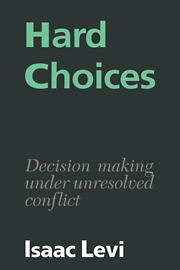Book contents
- Frontmatter
- Contents
- Preface
- 1 MORAL STRUGGLE
- 2 DILEMMAS
- 3 VALUES IN SCIENTIFIC INQUIRY
- 4 CHOICE AND FOREKNOWLEDGE
- 5 VALUE STRUCTURES
- 6 VALUES REVEALED BY CHOICES
- 7 UNCERTAINTY AS A SOURCE OF CONFLICT
- 8 CONFLICT AND SOCIAL AGENCY
- 9 DISTRIBUTING BENEFITS
- 10 UTILITARIANISM AND CONFLICT
- 11 SOCIAL CHOICE THEORY
- 12 CONFLICT AND INQUIRY
- Notes
- Bibiliography
- Name index
- Subject index
10 - UTILITARIANISM AND CONFLICT
Published online by Cambridge University Press: 05 June 2012
- Frontmatter
- Contents
- Preface
- 1 MORAL STRUGGLE
- 2 DILEMMAS
- 3 VALUES IN SCIENTIFIC INQUIRY
- 4 CHOICE AND FOREKNOWLEDGE
- 5 VALUE STRUCTURES
- 6 VALUES REVEALED BY CHOICES
- 7 UNCERTAINTY AS A SOURCE OF CONFLICT
- 8 CONFLICT AND SOCIAL AGENCY
- 9 DISTRIBUTING BENEFITS
- 10 UTILITARIANISM AND CONFLICT
- 11 SOCIAL CHOICE THEORY
- 12 CONFLICT AND INQUIRY
- Notes
- Bibiliography
- Name index
- Subject index
Summary
The sources of conflict
In the previous chapter, I argued that the average benefit principle can be made sensitive to questions of fair distribution if it is embedded in a criterion of abl(i)lex-admissibility. Thus, a currently fashionable complaint leveled against utilitarian and other types of value commitments marked by benevolence for all can be defused to a considerable degree. At the same time, this sensitivity is manifested only in cases of unresolved conflict. When utilitarians boast that their principles can form the basis for resolving conflicts in values, they are claiming that their value commitments are free of such conflict and to this extent cannot manifest the sensitivity to equity which abl(i)lex-admissibility allows.
Perhaps, however, utilitarians should not exhibit the regard for fair distribution their critics insist they should. Their strength resides in their boast that their principles enable us to resolve conflicts in values by appeal to antecedently available general criteria. Can they make good their boast? In this chapter, I shall point to three sources of conflict where, it seems to me, utilitarians should find themselves in considerable difficulty.
Concern and conflict
Utilitarians agree that each member of I ought to be an object of equal concern. This agreement transcends differences in the understanding of utility which divide classical from preference utilitarians or rule utilitarians from act utilitarians. Still, utilitarians often differ concerning the specification of the set I of objects of concern.
- Type
- Chapter
- Information
- Hard ChoicesDecision Making under Unresolved Conflict, pp. 185 - 200Publisher: Cambridge University PressPrint publication year: 1986



